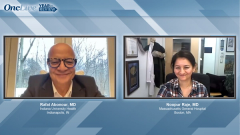
KarMMA-3: Trial of Ide-Cel in Patients with Triple Class Exposed R/R MM
Experts discuss the recent data presented at ASH 2023 from the KarMMA-3 trial in which ide-cel vs standard of care was studied in triple class exposed R/R MM patients.
Episodes in this series

This is a video synopsis/summary of an OncLive® Post-Conference Perspective involving Rafat Abonour, MD, and Noopur Raje, MD.
Abonour and Raje discuss results from the phase 3 KarMMa-3 trial of B-cell maturation antigen (BCMA)–targeted chimeric antigen receptor (CAR) T-cell therapy with idecabtagene vicleucel (ide-cel) vs standard of care in relapsed/refractory multiple myeloma after 2 to 4 prior lines of therapy. A total of 386 patients were randomly assigned 2:1 to receive ide-cel or standard-of-care regimens containing daratumumab, pomalidomide, and dexamethasone; daratumumab, bortezomib, and dexamethasone; ixazomib, lenalidomide, and dexamethasone; carfilzomib and dexamethasone; or elotuzumab, pomalidomide, and dexamethasone.
At a median follow-up of 31 months, ide-cel demonstrated superior progression-free survival compared with control (13.8 months vs 4.4 months, respectively). Objective response rate and duration of response also favored ide-cel. Crossover from the control arm to ide-cel was allowed, confounding overall survival analyses, but ide-cel showed consistent benefit across secondary end points.
Importantly, no new safety signals emerged with longer follow-up. Rates of cytokine release syndrome (5%) and neurotoxicity (3%) remain consistent with the known safety profile.
Abonour and Raje conclude that this robust data set supports using BCMA-targeted CAR T-cell therapy earlier in the treatment paradigm for patients with multiple myeloma, whereas it is currently approved in later-line settings. The safety profile remains manageable without emergence of delayed adverse events.
Video synopsis is AI-generated and reviewed by OncLive® editorial staff.







































